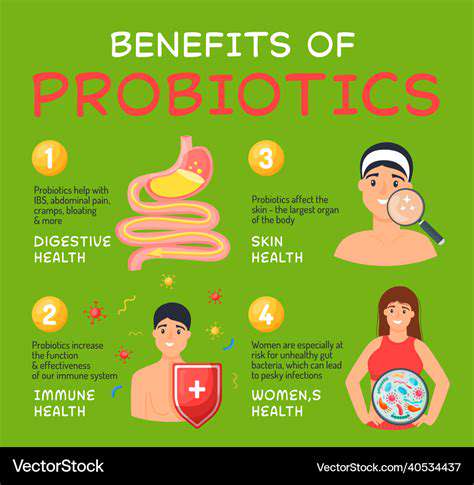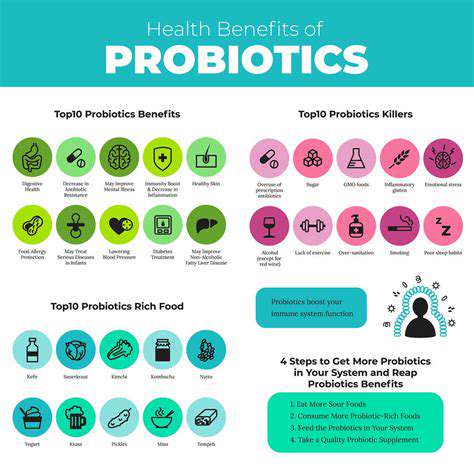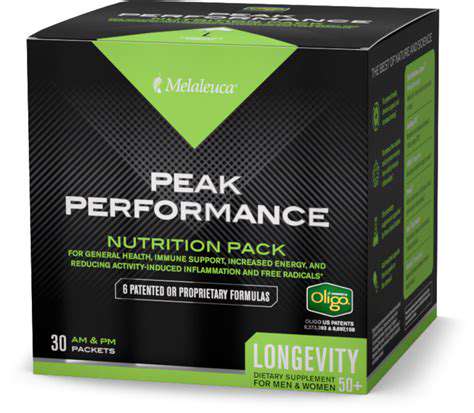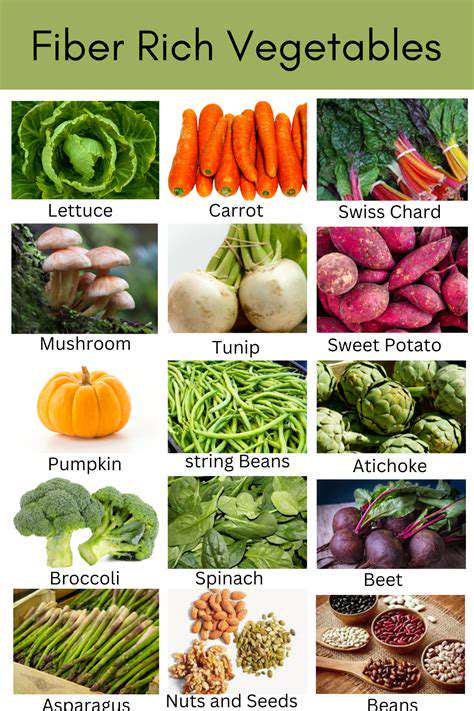Guide to Understanding Probiotics and Prebiotics
What Exactly Are Probiotics?
Probiotics represent living microorganisms that, when ingested in proper quantities, deliver tangible health advantages. These microscopic allies - primarily beneficial bacteria and yeasts - naturally occur in fermented products like yogurt and kefir. Their primary mission involves establishing colonies in our digestive tract, where they compete with harmful microbes while generating compounds that enhance our biological systems. A flourishing gut ecosystem proves indispensable for efficient digestion, optimal nutrient uptake, and robust immune defenses, positioning probiotics as crucial components of wellness strategies.
Various probiotic strains offer distinct benefits. Current scientific investigations reveal their potential to aid digestion, strengthen immunity, and possibly influence mental health positively. However, medical consultation becomes essential before making substantial dietary modifications, particularly for individuals managing chronic conditions or undergoing medication regimens.
Demystifying Prebiotics
Prebiotics constitute specialized plant fibers that selectively nourish desirable gut bacteria. Acting as premium fuel for probiotics, these indigestible compounds create ideal conditions for microbial prosperity. Naturally abundant in foods like onions, garlic, bananas, and asparagus, these fiber-rich edibles form the foundation for maintaining intestinal microbial equilibrium and supporting digestive wellness.
Why Gut Balance Matters
The intestinal microbial community serves as a cornerstone of physiological harmony. Beyond processing food, this microscopic ecosystem regulates waste elimination, fortifies immune defenses against pathogens, and helps control systemic inflammation. This intricate bacterial network even communicates with our nervous system, potentially influencing emotional states and cognitive functions. Preserving microbial diversity emerges as a fundamental aspect of comprehensive health maintenance.
The Power of Combined Action
Prebiotics and probiotics demonstrate extraordinary synergy through their complementary mechanisms. While probiotics introduce beneficial microbes, prebiotics provide the necessary nourishment for their proliferation. This symbiotic relationship establishes a virtuous cycle where thriving microbial populations continuously enhance digestive efficiency and immune competence. Strategic consumption of both components cultivates a resilient intestinal environment, leading to optimized nutrient processing and heightened disease resistance.
Dietary Sources to Consider
Nature provides abundant options for obtaining these microbial allies. Traditional fermented preparations like yogurt, kefir, sauerkraut, and kimchi deliver diverse probiotic strains. Concurrently, prebiotic fibers concentrate in bananas, allium vegetables, asparagus, and whole cereals. Nutritional variety proves paramount, as different foods contain varying microbial compositions and fiber types. Consumers should recognize that processing methods and storage conditions significantly impact the viability of these beneficial components.
Practical Implementation Guidelines
Incorporating these microbial supporters offers numerous potential advantages, from digestive comfort to immune enhancement and possible mood modulation. However, thoughtful implementation remains crucial - individuals with specific health concerns should obtain professional medical guidance before beginning supplementation. Initial consumption might cause temporary digestive adjustments as the microbial environment rebalances. Gradual introduction and careful observation help minimize transitional discomfort.
Gut Health Revolution: Probiotics and Prebiotics in Action

Probiotics: Microscopic Health Allies
These living microorganisms, predominantly bacteria and yeasts, demonstrate remarkable health-promoting properties when consumed regularly. Available in fermented foods and specialized supplements, these microscopic allies actively contribute to intestinal microbial diversity, which forms the foundation for efficient digestion, robust immunity, and general vitality. Their presence facilitates nutrient extraction from food while supporting defensive mechanisms against pathogens.
Scientific evidence indicates probiotic efficacy in addressing digestive disturbances, including irregular bowel patterns, while potentially lowering infection risks. Particular microbial strains show specificity in alleviating conditions like lactose malabsorption or irritable bowel discomfort. Ongoing research continues to elucidate the complex relationships between specific probiotic varieties and their physiological impacts.
Prebiotics: Microbial Nutrition
These specialized fibers resist human digestion but serve as premium nutrition for desirable gut microbes. Compounds like inulin, oligofructose, and galactooligosaccharides selectively stimulate beneficial bacterial growth patterns. By strategically nourishing these microbial populations, prebiotics contribute to digestive efficiency, immune modulation, and overall systemic health.
Regular prebiotic consumption fosters microbial equilibrium, creating an intestinal environment less hospitable to harmful microorganisms while supporting digestive comfort and metabolic efficiency. This nutritional strategy represents a foundational approach to maintaining long-term intestinal wellness.
Strategic Synergy
Combining these approaches creates multiplicative benefits beyond their individual effects. Probiotics introduce desirable microbes while prebiotics ensure their sustenance, resulting in amplified positive outcomes. This dual strategy promotes microbial diversity and resilience, leading to enhanced digestive performance, immune responsiveness, and potential systemic benefits.
Maintaining microbial diversity emerges as a critical health priority. Consistent consumption of probiotic and prebiotic sources, whether through dietary choices or targeted supplementation, supports this biological infrastructure. While scientific understanding continues evolving, current evidence strongly supports the integration of these approaches into comprehensive wellness strategies.
Implementation Strategies: Making Informed Choices

Distinguishing the Components
While frequently mentioned together, probiotics and prebiotics perform distinct yet complementary roles. Probiotics represent live microbial cultures that, when consumed appropriately, deliver measurable health advantages. In contrast, prebiotics consist of specialized fibers that selectively nourish existing beneficial gut bacteria, creating optimal conditions for their proliferation and activity.
Digestive Wellness Applications
Probiotics contribute significantly to gastrointestinal equilibrium, which translates to improved digestive comfort and nutrient utilization. Their regulatory influence can normalize bowel patterns while reducing common discomforts like abdominal distension. Emerging research suggests therapeutic potential for various digestive conditions, though further investigation will clarify optimal applications.
Clinical observations indicate particular probiotic strains may benefit inflammatory bowel conditions, highlighting the importance of strain-specific approaches. Microbial diversity consistently correlates with superior health outcomes across multiple physiological systems.
Prebiotic Selection Criteria
Various plant-based foods naturally contain these microbial nutrients. Strategic inclusion of prebiotic-rich foods supports specific beneficial bacterial populations, contributing to overall microbial balance. Understanding fiber varieties and their microbial preferences enables targeted dietary strategies for optimal gut health maintenance.
Supplement Selection Guidelines
When considering probiotic supplements, critical evaluation becomes essential. Effective products clearly specify bacterial strains and viable cell counts (CFUs), as different strains demonstrate varying physiological effects. Manufacturer reputation, product stability, and proper storage conditions significantly influence supplement efficacy and safety.
Safety Considerations
While generally well-tolerated, probiotics may initially cause mild digestive adjustments like gas or irregularity in sensitive individuals. Professional medical guidance proves particularly valuable for those with compromised immunity or complex health conditions considering probiotic use. Prebiotic fibers typically present minimal risk, though excessive intake may cause temporary digestive discomfort until microbial adaptation occurs.
Read more about Guide to Understanding Probiotics and Prebiotics
Hot Recommendations
-
*Guide to Managing Gout Through Diet
-
*Best Habits for Financial Well being
-
*How to Build a Routine for Better Mental Health
-
*How to Eat Healthy on a Budget [Tips & Meal Ideas]
-
*Guide to Practicing Self Acceptance
-
*How to Incorporate More Movement Into Your Day
-
*Guide to Managing Chronic Pain Naturally
-
*Guide to Building a Reading Habit for Well being
-
*Top 5 Weight Loss Supplements That Actually Work
-
*Best Exercises for Postpartum Recovery [Beyond Abdominal Work]











